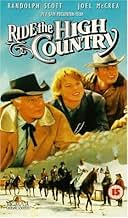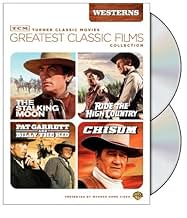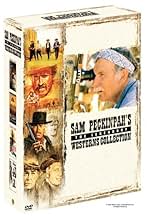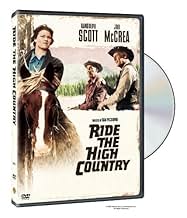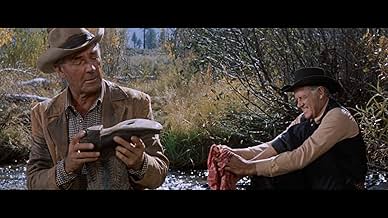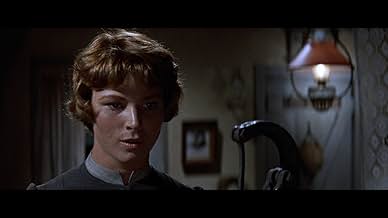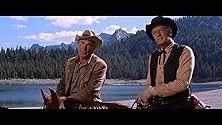IMDb रेटिंग
7.4/10
16 हज़ार
आपकी रेटिंग
अपनी भाषा में प्लॉट जोड़ेंAn ex-union soldier is hired to transport gold from a mining community through dangerous territory. But what he doesn't realize is that his partner and old friend is plotting to double-cross... सभी पढ़ेंAn ex-union soldier is hired to transport gold from a mining community through dangerous territory. But what he doesn't realize is that his partner and old friend is plotting to double-cross him.An ex-union soldier is hired to transport gold from a mining community through dangerous territory. But what he doesn't realize is that his partner and old friend is plotting to double-cross him.
- निर्देशक
- लेखक
- स्टार
- 1 BAFTA अवार्ड के लिए नामांकित
- 2 जीत और कुल 2 नामांकन
Alice Allyn
- Candy
- (बिना क्रेडिट के)
George Bell
- Townsman
- (बिना क्रेडिट के)
Oscar Blank
- Miner
- (बिना क्रेडिट के)
Chet Brandenburg
- Miner
- (बिना क्रेडिट के)
Don Brodie
- Spieler
- (बिना क्रेडिट के)
Chris Carter
- Rose
- (बिना क्रेडिट के)
फ़ीचर्ड समीक्षाएं
It was goodbye to two stars from the golden age of Westerns and hello to a director who would help transform the genre into something bloodier, nastier, and truer. A skillful compromise of those visions, "Ride The High Country" presents a kind of crossroads that feels more like a destination, a perfect summing-up of the legend and the reality of the American West.
Steve Judd (Joel McCrea) is a weary old lawman trying to make ends meet as he nears the end of the road. To transport some gold from a mining town to a bank, he takes on the services of an old buddy, Gil Westrum (Randolph Scott). Westrum's as sleek and angling as Judd is square, and has more on his mind than collecting $10 a day risking his neck guarding someone else's money. While this remains unsettled, the pair gets mixed up with a woman (Mariette Hartley) who thinks she's in love with a miner whose idea of a honeymoon means sharing the wealth with his hideous brothers.
Ask anyone with a glancing knowledge of films what kind of movies Sam Peckinpah made, and they will likely describe a movie very different from this. There's some shooting, a little blood, and an unshaven Warren Oates, but otherwise "Ride The High Country" is a movie in the classic Western mold. There are some dissonances for Scott and McCrea's old-time fans to sort through, like Scott's ambiguous morality, but this is all-in-all the nicest movie Peckinpah ever made, decent characters set against an inspiring landscape, the kind of yarn John Ford or Anthony Mann would have delivered.
Not that everything is too black-and-white. The girl, having escaped her stern father and the stump farm where they lived, asks Judd at one point about right and wrong: "It isn't that simple, is it?" "No, it isn't," Judd replies. "It should be, but it isn't."
McCrea is the center of this film, a pillar of virtue. He quotes the Bible, but it's not clear he's especially religious or just stoic in the classic tradition. When he talks about his simple desire "to enter my house justified," he may have the Christian meaning in mind, or just the humanistic ideal of having been a good man when all is said and done. Nevertheless, there are intimations of a deeper truth in the redemption of Westrum and his unambiguous last line: "I'll see you later."
Peckinpah does present a bull-headed Christian zealot in R.G. Armstrong as the girl's father, but he's essentially decent, afraid of life, what it did to him and can do to her. Some see a suggestion of incest in their relationship, when she tells him he doesn't want her with any man but him, but it's more likely that's her complaining about his being overprotective.
There's a lot of humor here, too, much of it courtesy of Randolph Scott. Scott could be a stiff in other films; here he settles nicely into the role of a cut-up, like when he watches his young charge Heck get the tar beaten out of him twice without lifting a finger to help him. "Good fight, I enjoyed it," Westrum chirps as the boy licks his wounds.
The film culminates in a good fight with the Hammonds, so ornery they jeer at Heck when he brings the girl to their doorstep and she assures them he was a gentleman: "How come? Something wrong with him?" It's the one gunfight in the film, and though its one more than some Peckinpah films like "Junior Bonner" had, it's another reason for the film sticking out as unusual in the director's oeuvre.
But it's a good kind of difference, for the most part, as Peckinpah finds his métier while paying tribute to those who came before him with the help of McCrea and Scott. Like its heroes, "Ride The High Country" moves a little slowly in parts, but watching it, you'll likely agree with me the long journey is worth the ride.
Steve Judd (Joel McCrea) is a weary old lawman trying to make ends meet as he nears the end of the road. To transport some gold from a mining town to a bank, he takes on the services of an old buddy, Gil Westrum (Randolph Scott). Westrum's as sleek and angling as Judd is square, and has more on his mind than collecting $10 a day risking his neck guarding someone else's money. While this remains unsettled, the pair gets mixed up with a woman (Mariette Hartley) who thinks she's in love with a miner whose idea of a honeymoon means sharing the wealth with his hideous brothers.
Ask anyone with a glancing knowledge of films what kind of movies Sam Peckinpah made, and they will likely describe a movie very different from this. There's some shooting, a little blood, and an unshaven Warren Oates, but otherwise "Ride The High Country" is a movie in the classic Western mold. There are some dissonances for Scott and McCrea's old-time fans to sort through, like Scott's ambiguous morality, but this is all-in-all the nicest movie Peckinpah ever made, decent characters set against an inspiring landscape, the kind of yarn John Ford or Anthony Mann would have delivered.
Not that everything is too black-and-white. The girl, having escaped her stern father and the stump farm where they lived, asks Judd at one point about right and wrong: "It isn't that simple, is it?" "No, it isn't," Judd replies. "It should be, but it isn't."
McCrea is the center of this film, a pillar of virtue. He quotes the Bible, but it's not clear he's especially religious or just stoic in the classic tradition. When he talks about his simple desire "to enter my house justified," he may have the Christian meaning in mind, or just the humanistic ideal of having been a good man when all is said and done. Nevertheless, there are intimations of a deeper truth in the redemption of Westrum and his unambiguous last line: "I'll see you later."
Peckinpah does present a bull-headed Christian zealot in R.G. Armstrong as the girl's father, but he's essentially decent, afraid of life, what it did to him and can do to her. Some see a suggestion of incest in their relationship, when she tells him he doesn't want her with any man but him, but it's more likely that's her complaining about his being overprotective.
There's a lot of humor here, too, much of it courtesy of Randolph Scott. Scott could be a stiff in other films; here he settles nicely into the role of a cut-up, like when he watches his young charge Heck get the tar beaten out of him twice without lifting a finger to help him. "Good fight, I enjoyed it," Westrum chirps as the boy licks his wounds.
The film culminates in a good fight with the Hammonds, so ornery they jeer at Heck when he brings the girl to their doorstep and she assures them he was a gentleman: "How come? Something wrong with him?" It's the one gunfight in the film, and though its one more than some Peckinpah films like "Junior Bonner" had, it's another reason for the film sticking out as unusual in the director's oeuvre.
But it's a good kind of difference, for the most part, as Peckinpah finds his métier while paying tribute to those who came before him with the help of McCrea and Scott. Like its heroes, "Ride The High Country" moves a little slowly in parts, but watching it, you'll likely agree with me the long journey is worth the ride.
Ride the High Country (1962)
*** (out of 4)
Sam Peckinpah directed western has Joel McCrea and Randolph Scott going into the mining country to bring gold down to a bank but Scott has a different set of plans. After hearing so much praise about this film I can't help but be somewhat letdown because there really isn't anything original here or anything too different than what we've seen before. The biggest aspect is seeing McCrae and Scott doing great work again and I really enjoyed the comic relief. The biggest problem with the film is the side story with the girl and things go downhill once they arrive at the mining town. A great music score and beautiful locations are another plus.
*** (out of 4)
Sam Peckinpah directed western has Joel McCrea and Randolph Scott going into the mining country to bring gold down to a bank but Scott has a different set of plans. After hearing so much praise about this film I can't help but be somewhat letdown because there really isn't anything original here or anything too different than what we've seen before. The biggest aspect is seeing McCrae and Scott doing great work again and I really enjoyed the comic relief. The biggest problem with the film is the side story with the girl and things go downhill once they arrive at the mining town. A great music score and beautiful locations are another plus.
A Bank assigns to veteran with noble purposes named Steve Judd (Joel McCrea) a dangerous mission , guarding a gold shipment . He hires an old friend gunfighter named Gil Westrum (Randolph Scott in his last movie) alongside a young pal (Starr), the trio join forces against risks and enemies . In the journey pick up a beautiful girl named Elsa (Mariette Hartley in his first movie) , daughter of a tyrant (R.G.Armstrong) and puritan old man . Elsa goes to marry to Billy Hammond (James Drury) in a ceremony celebrated by a boozy judge (Edgar Buchanan) . But she flees and is pursued by Billy's brothers (John Anderson,Warren Oates,LQ Jones and James Davies Chandler) . Meanwhile , respectable Joel McCrea justly to make a correct job , is double-crossed by his partners .
The picture is based on an interesting novel titled ¨Guns in the afternoon¨ by W. Stone . It was shot in California where is developed the plot and occurs the Western events although in limited budget . Two old men , tough Scott and upright McCrea , similarly their veteran characters play with great feeling and lyricism . The movie contains flawless performances , adventure , shootouts , villainy , romance and heroism with a terrific climax final including a mortal duel . The picture is a poem about the twilight Western and results to be a prophecy on the Western genre's downfall . This classic story comes to life enriched in color magnificence , splendidly photographed in Widescreen Metrocolor by Lucien Ballard although at the Television set loses its splendor . Besides , an evocative Western musical score by George Bassman . The two protagonists decided to leave the cinema business , but they retired with an excellent film , though Joel McCrea starred some film more for his son Jody McCrea . The motion picture is magnificently directed by Sam Peckimpah , an expert director and writer.
Sam Peckimpah , after beginning his career as a writer , he was soon involved in TV Westerns . Filming popular Western as ¨Rifleman¨ , ¨Westener¨ , and ¨Gunsmoke¨ . Moving into pictures in 1961 giving fine impression with ¨Deadly companions¨ starred by Brian Keith and Mauren O'Hara . After that , he did the prestigious ¨Ride the high county¨ that along with ¨Wild Bunch¨ , at the peak of his popularity , remain Sam's best films . Later on , he made ¨Major Dundee¨ that was heavily re-cutting . He subsequently filmed tougher-than-tough action movies , including gushing blood and guts with particular images in slow-moving , such as : ¨The getaway¨ , ¨the killer elite¨, the most popular ¨Straw dogs¨ , Convoy¨, and ¨The Osterman weekend¨ , until his early death .
The picture is based on an interesting novel titled ¨Guns in the afternoon¨ by W. Stone . It was shot in California where is developed the plot and occurs the Western events although in limited budget . Two old men , tough Scott and upright McCrea , similarly their veteran characters play with great feeling and lyricism . The movie contains flawless performances , adventure , shootouts , villainy , romance and heroism with a terrific climax final including a mortal duel . The picture is a poem about the twilight Western and results to be a prophecy on the Western genre's downfall . This classic story comes to life enriched in color magnificence , splendidly photographed in Widescreen Metrocolor by Lucien Ballard although at the Television set loses its splendor . Besides , an evocative Western musical score by George Bassman . The two protagonists decided to leave the cinema business , but they retired with an excellent film , though Joel McCrea starred some film more for his son Jody McCrea . The motion picture is magnificently directed by Sam Peckimpah , an expert director and writer.
Sam Peckimpah , after beginning his career as a writer , he was soon involved in TV Westerns . Filming popular Western as ¨Rifleman¨ , ¨Westener¨ , and ¨Gunsmoke¨ . Moving into pictures in 1961 giving fine impression with ¨Deadly companions¨ starred by Brian Keith and Mauren O'Hara . After that , he did the prestigious ¨Ride the high county¨ that along with ¨Wild Bunch¨ , at the peak of his popularity , remain Sam's best films . Later on , he made ¨Major Dundee¨ that was heavily re-cutting . He subsequently filmed tougher-than-tough action movies , including gushing blood and guts with particular images in slow-moving , such as : ¨The getaway¨ , ¨the killer elite¨, the most popular ¨Straw dogs¨ , Convoy¨, and ¨The Osterman weekend¨ , until his early death .
"In simple terms, Ride the High Country was about salvation and loneliness" - Sam Peckinpah
Both in their 60s at the time, Joel McCrea and Randolph Scott summed up their careers in Sam Peckinpah's second film, Ride the High Country. After two hundred films between them, this was Scott's final film and McCrea's second to last. The film was shot in only twenty-six days and played mostly as bottom filler for double bills. It was only after winning first prize at the Cannes Film Festival that it began to be appreciated for the true classic it is. Set in the early days of the century, the days of the cowpoke are giving way to the modern modes of transportation and communication. People like lawman Steve Judd (Joel McCrea), with a reputation for fierce integrity may be obsolete in the New West but his dignity and strength of character make him a hero worthy of admiration.
The film is both a lament for the passing of the Old West and a gentle celebration of humanity's search for friendship, honor, and trust. Both men feel they have somehow failed to live up to their standards and want one more chance to redeem their honor. Judd wants to recapture some measure of self-respect while Westrum looks for the material wealth that has always eluded him. As the film opens, Judd hires his ex-deputy Gil Westrum (Randolph Scott) to help him transport a shipment of gold bullion down from the high Sierras, a job in which six prior attempts ended in failure. Against Judd's advice, they bring along a third man - a wild, womanizing youth named Heck Longtree (Ron Starr), who proves to them that he can handle himself in a fistfight.
Things get complicated when they spend the night at a farm run by puritanical Joshua Knudson (R.G. Armstrong) and Heck is taken with his beautiful daughter Elsa (Mariette Hartley). Feeling thwarted by her possessive and moralizing father, Elsa runs away with the trio hoping to find a miner, Billy Hammond (James Drury) who has promised to marry her. As they ride up into the hills, the cinematography by Lucien Ballard reflects the beauty of the West as it has rarely been seen. When they arrive, things go from bad to worse for Elsa. Preceded by a marvelously comic horseback parade in which the boys sing When the Roll is Called Up Yonder, she is married to Billy in a saloon presided over by an inebriated judge.
Unfortunately, she has to be rescued by Judd after Billy Boy plans to share his bride with his four redneck brothers on their wedding night. The wedding scene is shown from Elsa's point of view and it is sympathetic and touching. On the way back with the gold, however, Gil turns on his old friend, plotting with Heck to steal the gold. In a famous exchange, Gil asks Judd, `Pardner, you know what's on the back of a poor man when he dies? The clothes of pride. Is that all you want?' To this Judd replies `All I want is to enter my house justified.' When the travelers encounter the Hammond boys waiting to ambush them at the farm, both men must confront their deepest fears and their noblest truths.
Both in their 60s at the time, Joel McCrea and Randolph Scott summed up their careers in Sam Peckinpah's second film, Ride the High Country. After two hundred films between them, this was Scott's final film and McCrea's second to last. The film was shot in only twenty-six days and played mostly as bottom filler for double bills. It was only after winning first prize at the Cannes Film Festival that it began to be appreciated for the true classic it is. Set in the early days of the century, the days of the cowpoke are giving way to the modern modes of transportation and communication. People like lawman Steve Judd (Joel McCrea), with a reputation for fierce integrity may be obsolete in the New West but his dignity and strength of character make him a hero worthy of admiration.
The film is both a lament for the passing of the Old West and a gentle celebration of humanity's search for friendship, honor, and trust. Both men feel they have somehow failed to live up to their standards and want one more chance to redeem their honor. Judd wants to recapture some measure of self-respect while Westrum looks for the material wealth that has always eluded him. As the film opens, Judd hires his ex-deputy Gil Westrum (Randolph Scott) to help him transport a shipment of gold bullion down from the high Sierras, a job in which six prior attempts ended in failure. Against Judd's advice, they bring along a third man - a wild, womanizing youth named Heck Longtree (Ron Starr), who proves to them that he can handle himself in a fistfight.
Things get complicated when they spend the night at a farm run by puritanical Joshua Knudson (R.G. Armstrong) and Heck is taken with his beautiful daughter Elsa (Mariette Hartley). Feeling thwarted by her possessive and moralizing father, Elsa runs away with the trio hoping to find a miner, Billy Hammond (James Drury) who has promised to marry her. As they ride up into the hills, the cinematography by Lucien Ballard reflects the beauty of the West as it has rarely been seen. When they arrive, things go from bad to worse for Elsa. Preceded by a marvelously comic horseback parade in which the boys sing When the Roll is Called Up Yonder, she is married to Billy in a saloon presided over by an inebriated judge.
Unfortunately, she has to be rescued by Judd after Billy Boy plans to share his bride with his four redneck brothers on their wedding night. The wedding scene is shown from Elsa's point of view and it is sympathetic and touching. On the way back with the gold, however, Gil turns on his old friend, plotting with Heck to steal the gold. In a famous exchange, Gil asks Judd, `Pardner, you know what's on the back of a poor man when he dies? The clothes of pride. Is that all you want?' To this Judd replies `All I want is to enter my house justified.' When the travelers encounter the Hammond boys waiting to ambush them at the farm, both men must confront their deepest fears and their noblest truths.
This is an important western because the subplot of a young woman's life in the remote west is addressed. At this time many women were looked upon as chattel. Here a young woman escapes farm life with an overbearing religious father who beats her, to flee into marriage with a redneck miner who beats her and plans to share her with his brothers and father. The lead character played by veteran Joel McCrea is trying to earn an honorable living because there is no pension or social security benefits for him to rely on. Randolph Scott is trying to score some easy dough to last during his retirement. A fine movie about morality, honor, and duty.
क्या आपको पता है
- ट्रिवियाFinal film of Randolph Scott. He retired from acting once he saw the finished film, saying he wanted to quit while he was ahead and that he would never be able to better his work here.
- गूफ़The many 34-star flags, all on flagpoles, at the opening of the movie do not match the Bobby helmets, open automobiles and electric wiring over the streets. The 34-star U.S. flag was in use only from 1861-1863. There is, however, also an inconsistent 45-star flag strung across the street. That design, in use from 1896-1908, does match the movie's time setting.
- भाव
Steve Judd: All I want is to enter my house justified.
- क्रेज़ी क्रेडिटIntroducing Mariette Hartley
- कनेक्शनFeatured in America at the Movies (1976)
टॉप पसंद
रेटिंग देने के लिए साइन-इन करें और वैयक्तिकृत सुझावों के लिए वॉचलिस्ट करें
विवरण
- रिलीज़ की तारीख़
- कंट्री ऑफ़ ओरिजिन
- भाषाएं
- इस रूप में भी जाना जाता है
- Guns in the Afternoon
- फ़िल्माने की जगहें
- Mammoth Lakes, कैलिफोर्निया, संयुक्त राज्य अमेरिका(Twin Lake, Horseshoe Lake)
- उत्पादन कंपनी
- IMDbPro पर और कंपनी क्रेडिट देखें
बॉक्स ऑफ़िस
- बजट
- $8,13,000(अनुमानित)
- चलने की अवधि1 घंटा 34 मिनट
- रंग
- पक्ष अनुपात
- 2.35 : 1
इस पेज में योगदान दें
किसी बदलाव का सुझाव दें या अनुपलब्ध कॉन्टेंट जोड़ें



